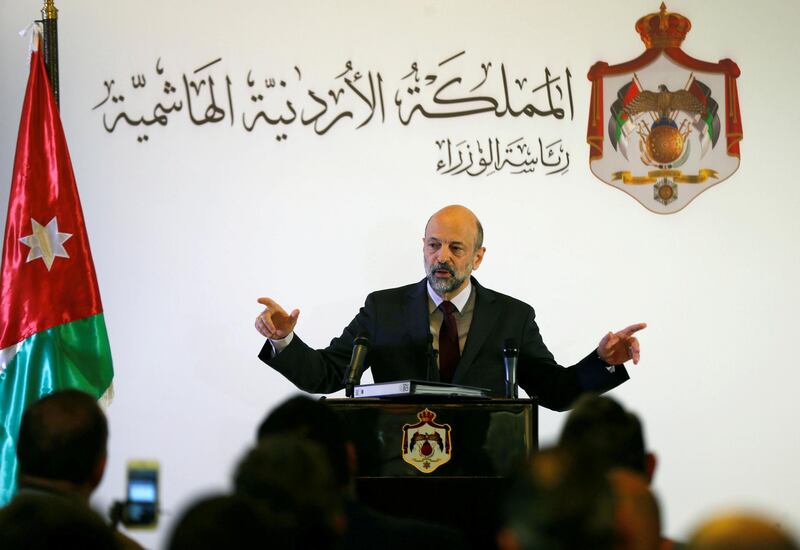One day after his cabinet submitted their resignations, Jordanian prime minister Omar Razzaz was busy behind the scenes on Tuesday to form what is expected to be a broader government to push through economic reforms amid growing pessimism across Jordan.
In what is normally a swift, almost-scripted affair, the much-discussed cabinet shakeup - the fourth in the last year - stretched on to its second day on Tuesday after Mr Razzaz met with parliamentarians and reportedly discussed cabinet formation with political groups, unionists and experts.
In his appointment in 2018 and previous reshuffles, Mr Razzaz attempted to steer away from the Jordanian custom of drawing a balance of ministers from various tribes, regions and communities and instead pushed for technocrat cabinet based on ability, rather than familial ties.
His new approach led to a hold-up in his appointment and a showdown with multiple tribal leaders and MPs in 2018.
But the most urgent challenge facing Mr Razzaz and the rest of the country is the economy.
Tasked by King Abdullah II in June 2018 with righting the ship after nationwide protests brought down Mr Razzaz’s predecessor over tax-heavy policies and a controversial income tax, indicators have been less than positive.
Unemployment is at a record 19 per cent, reaching 40 per cent among Jordanians aged 15-30. Growth continues to sputter around 2 per cent and the budget deficit is forecast by some experts to reach $1.2 billion USD despite several cuts in subsidies and services.
Jordan still faces a debt crisis, with public debt levels hovering around 95 per cent of GDP, and must cut the debt burden down to 70 per cent as part of a $723 million IMF credit line.
In a bid to correct course late last month, Mr Razzaz launched a series of far-reaching economic reforms to “stimulate” the Jordanian economy, including waving fees on real estate transactions, financial incentives companies hiring of Jordanians, and lessening electricity costs for critical sectors such as industry and tourism.
King Abdullah has made job-creation and business-friendly reforms a priority for the country, with employment for young Jordanians at the top of the monarch’s directives to the government on multiple occasions in the past year.
“These reforms sent a positive message to investors, that the government knows there are concerns and is trying to address them,” says Jawad Anani, former deputy prime minister, royal court chief and economic expert.
Yet according to a public opinion survey released on Monday by the University of Jordan’s Centre of Strategic Studies (CSS), less than one-third (31 per cent) of Jordanians were aware that the government had released a new economic reform package.
Rather than a minor reshuffle, insiders and observers are expecting a much bigger shakeup as Mr Razzaz attempts to push through economic reforms and head off any potential popular protests and citizens continue to chafe under austerity measures, rising costs of living and stagnant wages.
“The next government will have to be at it’s very best, act swiftly and openly and show results for two straight years before it can regain public confidence,” Mr Anani said.
Also on the docket for the new government will be the 2020 budget and a contentious fight as it looks to cut services and freeze salaries at a time the cost of living in the kingdom is rising.
The shakeup also comes weeks after a mishandled nationwide teachers’ strike escalated into a political crisis that nearly brought down the government, saw the public side with teachers, cost weeks of the school year and forced the government to blink and grant educators a 50 per cent raise.
In a June a CSS survey marking one year of Mr Razzaz’s term, only 32 per cent of Jordanians had confidence that the cabinet could “carry its responsibilities.”
Mr Razzaz’s favourability rating had plunged from 62 per cent days after he was appointed in June 2018, when many saw him as a potential saviour, to 40 per cent in June 2019 - the second-lowest favourability rating for a premier since the survey started in 2011.






